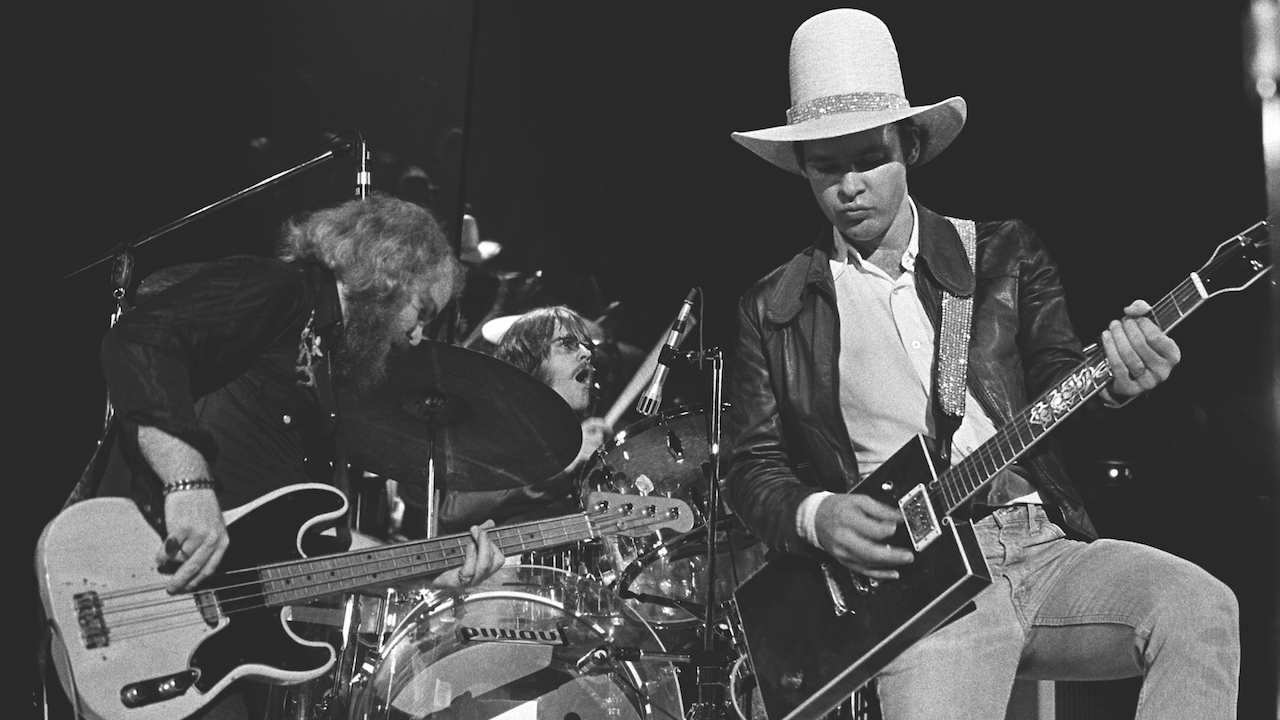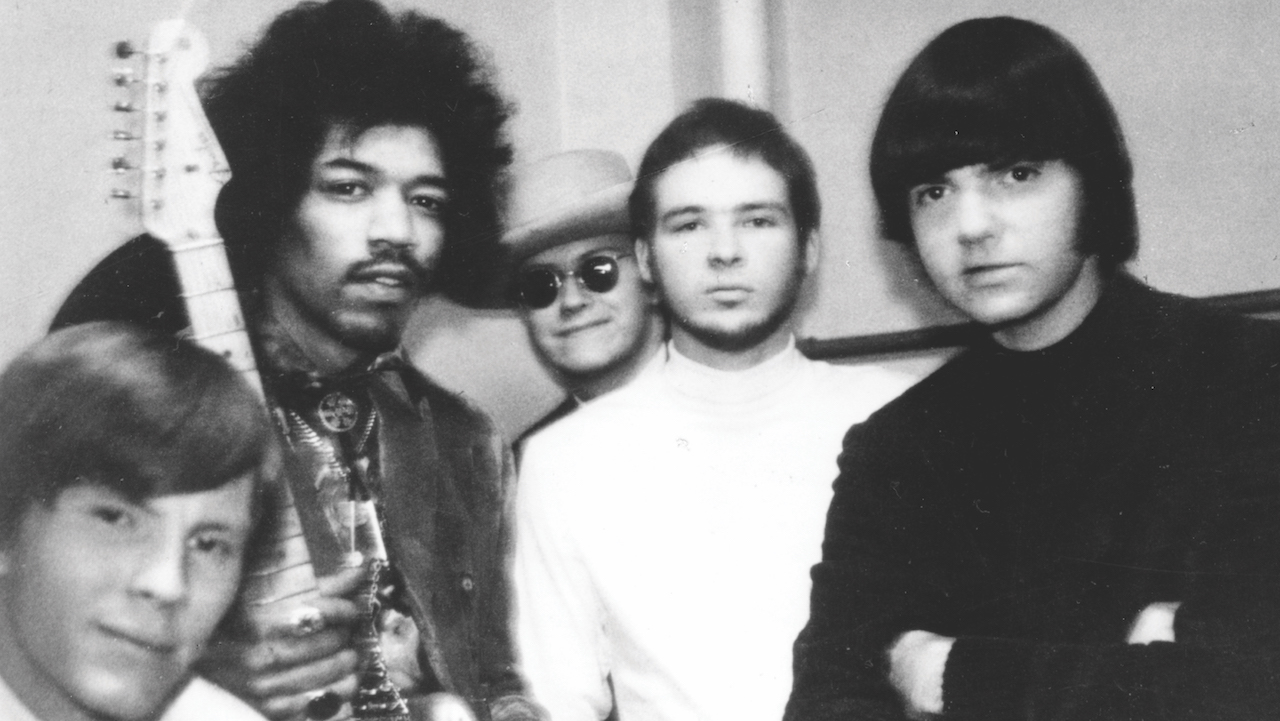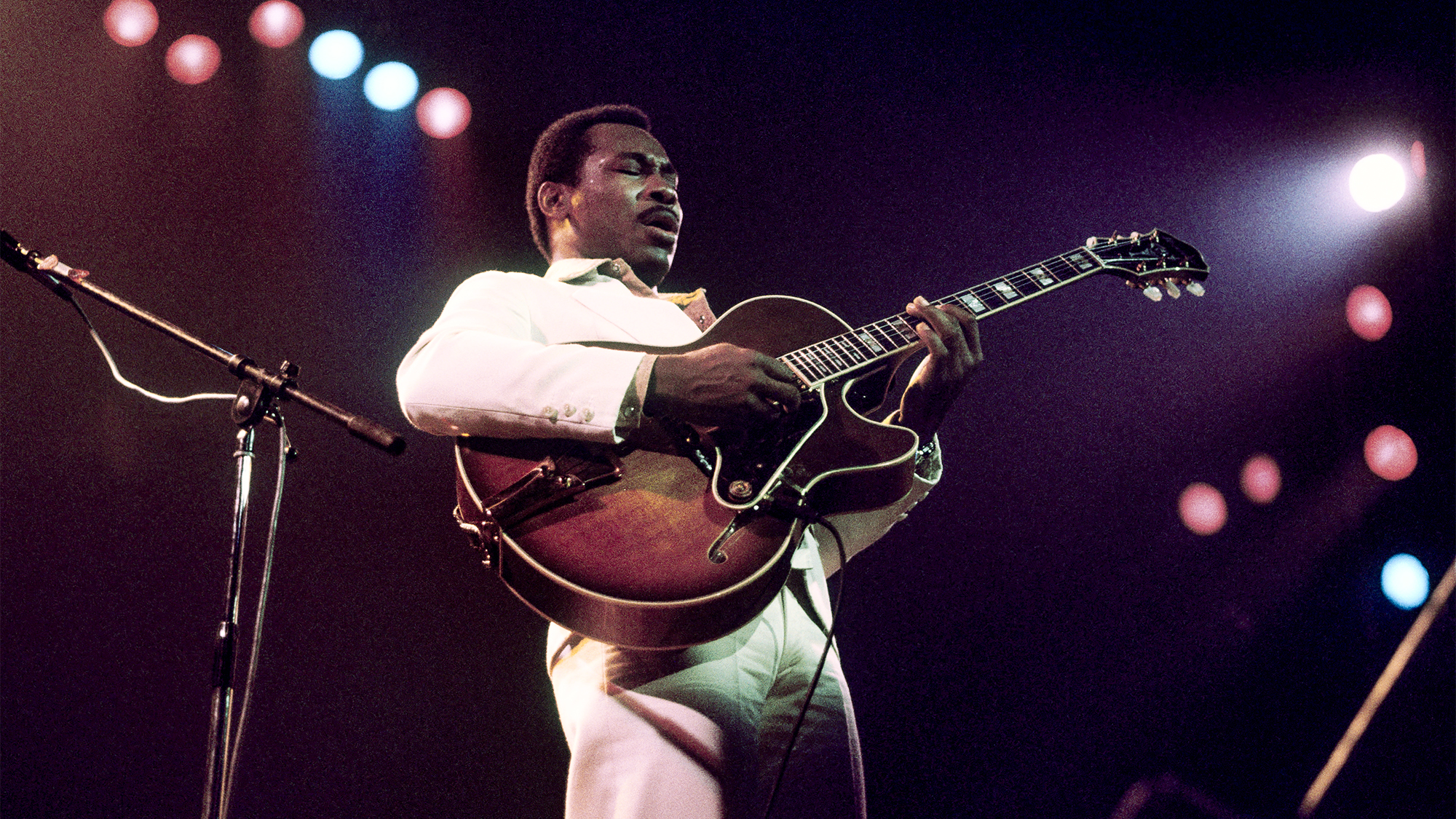"Waiting for the Bus and Jesus Just Left Chicago? In essence, it’s a blues suite in 4/4 and 6/8 time..." The career of Billy Gibbons, blues guitar supremo, in five songs
From early days in Moving Sidewalks, opening for the Jimi Hendrix Experience to taking the world by storm on 1980s MTV with ZZ Top, he’s defied convention. Here are five deep cuts Billy Gibbons considers his best

All the latest guitar news, interviews, lessons, reviews, deals and more, direct to your inbox!
You are now subscribed
Your newsletter sign-up was successful
When we asked Billy F. Gibbons to select five key songs from across his career, there was a proviso: He couldn’t include “La Grange,” as it had already been the subject of in-depth scrutiny in our “How I Wrote” feature of May 2021.
“When I was asked to participate in this series, I got lit up and began peeling the onion over what songs to zero in on,” the Reverend tells us. “The most obvious, ‘La Grange,’ was ZZ Top’s first national breakthrough to climb the pop singles chart. But, alas, having been asked to set it aside, the question that I had to ponder was, ‘Where to start?’”
Certainly, it’s no easy task when you’ve got a back catalog with the quality and depth that Gibbons has amassed both with ZZ Top and in more recent years as a solo artist, where he’s found an alternative outlet for his creativity.
“It’s something of a different headspace when engaging with the solo excursion adjacent to ZZ,” he explains. “Of course, the sometimes obvious six-string similarities have much in common, yet there’s a considerable vibe in the mix.
“There’s mucho feel, which can connect in a very ZZ-like way, and yet also some far-fetched opposites to balance the affair. Some of it’s a bit outside, some a bit inside, but all of it is quirky. The down-and-dirty process slides into mindless instinct while bringing things to conclusion.”
As far as Gibbons is concerned, the solo process fires up the creative juices for ZZ Top, and vice versa, with ZZ looking at scheduling some recording time in the near future. “Yes, we’re on the edges of nailing another album down. Keeping the band on the road so much of late continues to stir up the angst for a rapid studio return. I guess it’s time to write the new ones.”
When they get around to recording them, those tracks will be the band’s first with bassist Elwood Francis, Gibbons’ guitar tech for three decades, who came into ZZ Top following the 2021 death of founding bassist Dusty Hill. As far as Gibbons is concerned, they couldn’t have found a better person to step up to the plate and fill Dusty’s shoes.
All the latest guitar news, interviews, lessons, reviews, deals and more, direct to your inbox!

“The directed transition eased in, with all the senses fired up,” he says. “The unexpected but strident instruction came from Dusty to get Elwood to fill the spot when he knew he was going to be out of action for a few months prior to his death. We accommodated his wishes and immediately solidified the move. It’s a legacy from the Dust, moving forward with Elwood keeping the bottom on the Top.”
Gear-wise, of late, Gibbons has been seen sporting a hybrid SG-style guitar that features a Flying V-styled headstock. “We defined a design that emerged from the drawing table,” he says.
“It was a valued collaboration with John Bolin at Bolin Guitars and the fine folks at Gibson. It’s an expression with a visual appeal which seems to work, while working within the collective components found throughout the running history of Gibson appointments.”
As always, Gibbons continues to favor extremely light-gauge strings, which seems remarkable given the depth and weight of tone that he manages to pull from his axes. “Yes, Jim Dunlop managed to draw the ultra-light .007 gauge wire with success on all counts,” he affirms.
“The resiliency of the string’s tension, combined with the secrets of the Dunlop alloy, make for some rad reaches for bending over the fretboard. They require nothing in the way of adjusting your touch or approach. It’s just a matter of grab the guitar and go.”
Gibbons has long been renowned as a collector of some of the finest guitars ever created, plus some of the downright weirdest. There remains one guitar though, that is his most prized possession.

“That’s gotta be that mysteriously magnetic Pearly Gates, the ’59 Les Paul Standard that sounds like no other I’ve encountered,” he says. “She’s gotta be the first I’d put in the ‘go’ bag in the event of fire or disaster. The real trick is thinking about the next one.” Gibbons continues to find inspiration in the blues music that first excited him, and in making music with some long-time Texan contemporaries.
“Seems that lately we return to a handful of a dozen select LPs or so which continue to inspire. It’s an ongoing discussion among the regular gathering with our sideband act, the Jungle Show, back in Texas, with Jimmie Vaughan, Sue Foley, Mike Flanigin and Chris ‘Whipper’ Layton, as we go on arguing about elusive new directions which might light the fuse unexpectedly. We know it’s out there. It just morphs into the unknown as fast as greased lightning.”
Given the number of years and miles Gibbons has put on the clock since the mid- ’60s, you would be forgiven for thinking that it might start to take its toll, but you’d be way off the mark.
“I’m more excited and enthused than ever before, if that’s possible,” he attests. “Having this job — getting out there and playing each and every night, spending countless studio hours exchanging sonic ideas with others — is one of the greatest privileges one could have. Sometimes, dreams abound in Technicolor about thrashing on the guitar, and then it happens to righteously unfold onstage.
“Hard to predict, yet easy to savor and enjoy. I never tire of the old ZZ Top standards. They’re like old friends and it’s always good to get together with them. When they’re played, there’s a recurrent recollection of what it was like early on, so it becomes ‘the now.’ At the same time, it’s a vivid trip down memory lane. There’s a new stage and a new audience to engage which always keeps things fresh, fine and foolish.”
99th Floor – Moving Sidewalks (Single, 1967)
“Going way back to the Moving Sidewalks, our pre-ZZ band, we stabbed the stake in the ground. That was back in those pre-Cream, pre–Jimi Hendrix Experience days, inspired by psychedelic pioneers and fellow Texan pals the 13th Floor Elevators. Their brilliant frontman, Roky Erickson, was, as they say in the tech biz, ‘an early adopter’ — of exactly what is hard to say.
"The Elevators came up with some rather unearthly sounds, not previously conceptualized. Elevators go up and sidewalks move forward, which inevitably brought the name ‘the Moving Sidewalks’ into focus, figuring the realm to be all things horizontal — the contradiction, of course, being ‘99th Floor.’
“The first recorded version of the number, by the way, pre-dates the Sidewalks, as it was originally cut with Billy G and the Blue Flames, my band from way, way back. We recorded the demo to get the ball rolling, moving into the Sidewalks with drummer Dee Merrill Mitchell.
“We re-recorded a streamlined version, releasing the new track on the Tantara label, which hit with some commotion in Houston. The folks at Scepter caught it and licensed it for their Wand subsidiary — the same label as ‘Louie Louie’ by the Kingsmen, along with the classic ‘Twist and Shout’ by the Isley Brothers. That was some seriously august labelmate company we were keeping.
“That release led to additional airplay and touring opportunities, including teaming up with the Jimi Hendrix Experience, who became our friends and mentors. As I remember it, I played a Fender Jazzmaster through a Vox Super Beatle, and a Hohner harp through a Fender Bassman.”
Waiting for the Bus/Jesus Just Left Chicago – ZZ Top (Tres Hombres, 1973)
“Yes, there are two song titles here, I admit, yet the two tracks are counted as one song stream. That’s the way they’ve been perceived ever since they debuted as ‘side one, tracks one and two’ on the album Tres Hombres.
“Our engineer, navigating the space between the two songs, used the tried-and-almost-true method of razor blading for tape splicing, and it seemed then he did too good a job.
“However, the effect eliminated any silent space between the two songs on the album. The two tracks heard together in rapid succession made for an unplanned — or maybe unchained — medley that serves both of the songs so well.
“The two are really one in most fans’ eyes. ‘Waiting’ offered an anticipatory experience of a down-and-outer spending a significant part of a day in a state of suspension, and ‘Jesus’ set the pace moving from Chicago to New Orleans and all points in between. [laughs] In essence, it’s a blues suite in 4/4 and 6/8 time.
“It’s still being auspiciously delivered on the concert stage as a ‘two-fer.’ The guitars of choice for this were a ’54 hardtail Strat and Pearly Gates, the ’59 ’Burst, through an early Marshall 1968 Super Lead 100.”
Legs – ZZ Top (Eliminator, 1983)
“This is an exemplar of the Eliminator era, although we might equally lean into ‘Sharp Dressed Man’ or perhaps ‘Gimme All Your Lovin’ from the same zillion-selling album. This was the time when that little red ’33 Ford three-window coupe became a cultural icon, when MTV began and against the odds created an unexpected ZZ Top video trio commotion.
“The unassuming fact remains, we ceded the spotlight to ‘them pretty gals’ and the cool, custom car. It translated to the stage easily, as we used the fuzzy, spinning guitars seen in the video. and the visual connection ignited a delight with audiences across the board.
“That video, by the way, was a reshoot. The original filming, shot over a weekend, was accidentally misplaced by a lab worker which required us to return back the very next week, reshooting the whole thing, frame by frame.
“Quite the happy accident, on par with the ‘Waiting’/‘Jesus’ splice, especially when the song went Top 10 for an extended run of months on the charts. And wouldn’t you know it, it was adapted for use in a pantyhose commercial: Pins ‘R’ Us!
“The guitar used to record it was a fur-covered solid-body plank fabricated from the Bolin production line, mic’d up under an ark of archaic tube amps that I named the Amp Cabin.”
I Gotsta Get Paid – ZZ Top (La Futura, 2012)
“This is another favored track definitely perceived as a left-field turn, as it’s actually an interpretation of a track borne of the Houston ghetto: ‘25 Lighters’ by DJ DMD, featuring Lil’ Keke and Fat Pat.
“Our engineer, G.L. ‘G-Mane’ Moon, worked at John Moran’s Digital Services in Houston, the studios patronized by a plethora of rap and hip-hop clients.
“We shared many off and on hours with some of those cats, coming up with some rad ideas and comparing notes. Our newfound friends showed us beats, and we showed them some guitar chops, as could only happen in Houston.
“We dig into that track with our own take inspired by a coupling of Lightnin’ Hopkins styling throughout. The song was a highlight of La Futura. I think many Top fans perceived that album as one of our strongest for many years, and it certainly felt like it was a worthy addition to our catalog.
“Once again, when it comes to the perfect tool for the job, Pearly Gates stepped up to the task, bolstered with a mid-’60s Fender VI running through a blond Fender reverb tank.”
Treat Her Right – Billy Gibbons & The BFGs (Perfectamundo, 2015)
“Lastly, I’ve decided to go for ‘Treat Her Right,’ from my first BFG solo album, Perfectamundo, which was recorded and released in preparation for the annual Havana Jazz Festival, following an invitation to perform there.
“The brainstorming in the recording studio led to delving, in advance of that performance, into the world of Afro-Cuban music. This lit up the idea of recording a Latin-inflected record that drew upon the revered experience as apprentice to Tito Puente many years earlier.
“Of course, the original version by Roy Head, recorded and released on Don Roby’s Back Beat label, made a huge splash, crossing all charts when it came out in 1965. Knowing Roy Head and his inimitable frantic stage antics, we attempted to follow the rhythmic exercises, and so it was with the BFGs jumping at the notion to take it for a ride. Upon its release, word reached us of Roy’s delight over our recorded efforts.
“Speaking of Mr. Head, Roy included a song on the flip of his ‘Your (Almost) Tuff’ single entitled ‘Tush Hog’ back in the day, and, of course, that possibly led to a veiled R&B influence on another favorite, ZZ Top’s ‘Tush.’
“The guitar and amp was the same as can be seen on the Conan O’Brien TV clip: a Fender Cohiba Esquire hard-wired into a Magnatone Super 15 tube amp, gained hard with the volume cranked out.”
For more on Billy Gibbons, visit his website
Mark is a freelance writer with particular expertise in the fields of ‘70s glam, punk, rockabilly and classic ‘50s rock and roll. He sings and plays guitar in his own musical project, Star Studded Sham, which has been described as sounding like the hits of T. Rex and Slade as played by Johnny Thunders. He had several indie hits with his band, Private Sector and has worked with a host of UK punk luminaries. Mark also presents themed radio shows for Generating Steam Heat. He has just completed his first novel, The Bulletproof Truth, and is currently working on the sequel.




